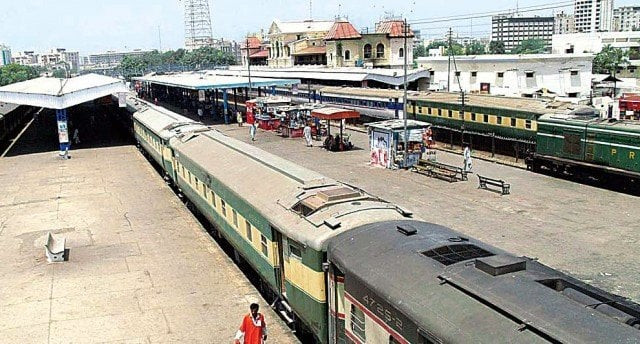Railways seeks Rs11b for protection of ML-I project
Move comes in addition to two special security divisions already set up by military for CPEC

The Pakistan Railways has sought Rs11 billion to protect Mainline-I project of the China-Pakistan Economic Corridor despite creation of two special security divisions by the military costing nearly Rs23 billion every year.
The railways authorities have asked the government to provide 1% of the total cost of $6.8 billion of the ML-I project to protect the infrastructure and human resource, sources in the Ministry of Finance said. The 1% cost is equal to roughly $69 million or Rs11 billion at current exchange rate. The money is being sought for the armed forces and Pakistan Railways, the sources said.
The ML-I is the single largest project of the multibillion-dollar strategic initiative but the work on it has not yet begun due to delay in securing a $6 billion loan from China.
The demand for 1% security cost has not yet been accepted by the federal government due to the already huge cost being incurred on protecting the CPEC projects, the sources said.
Foreign Minister Shah Mahmood Qureshi recently said that India has set up a special cell to sabotage CPEC –the flagship project of the Belt and Road Initiative of the Chinese president.
The Ministry of Railways has pressed the demand amid a delay in finalising the financing arrangements with China, which is pre-requisite to commence the construction work on the project that faces delays of over three years.
The Pakistan Railways director general planning was not available for comments. The railways minister also did not respond to the calls.
The railways placed the demand without need assessment and also did not take into consideration the two special security divisions, a senior official of the Planning Commission said.
Pakistan had raised Special Security Division South and Special Security Division North to protect the CPEC projects during the construction phase. In October last year, the federal cabinet approved another Rs16.5 billion for Special Security Division, South. The cost of raising the Special Security Division, South, of about 13,000 personnel has been estimated at Rs93 billion over a period of seven years. The force is being raised for protection of 42 CPEC projects.
In addition to that, Rs6.2 billion is annually spent on Special Security Division, North, an official of the Ministry of Finance said.
The ML-I project starts from Peshawar and ends at Karachi.
The idea behind raising these two special divisions was to protect the project sites during the construction period and then move the deployed forces to other places, the sources said. They said that the ML-I security needs can be met without allocating additional budget and human resources.
Initially, the Pakistan Railways had embedded the $69 million in the total project cost. However, the Planning Commission had excluded the security cost component by terming it “unjustified” while approving the project last year.
According to the decision of the Executive Committee of National Economic Council, “The cost of security amounting to $69 million or close to Rs11 billion with 50% share for Railways Police and 50% share for security forces is not justified and should be deleted from the project cost estimates.”
Under the project, the existing nearly 1,900km long track will be upgraded. The speed of passenger trains will increase from 65 to 110 km/hour to 165 km/hour and the line capacity will increase from 34 to 137/171 trains each way per day.
The Planning Commission authorities were also of the view that the $69 million demand was not justified given the fact that there was already a dedicated Railways Police in addition to special units set up in the provinces to protect CPEC.
In April 2016, the then government had approved charging 1% of the capital cost of energy projects on account of CPEC security.
An early start of construction work on the only “strategically important project” is also unlikely after China linked the civil works with prior finalisation of the financing mechanism. Unlike Pakistan’s expectations of getting the $6 billion loan at 1% interest rate, China has proposed a mix of commercial and concessional lending, the sources said.
The economic affairs ministry proposed 1% rate while the Ministry of Railways was inclined to take the mix of commercial and concessional rate, subject to the condition that the average rate might remain lower than 2.38%, the sources said.
Pakistan is also seeking a grace period of 10 years for repayment of the loan against Chinese proposal of a five-year period.
China has offered to finance 85% of the project cost with payback period of 15 to 20 years in biannual tranches.



















COMMENTS
Comments are moderated and generally will be posted if they are on-topic and not abusive.
For more information, please see our Comments FAQ